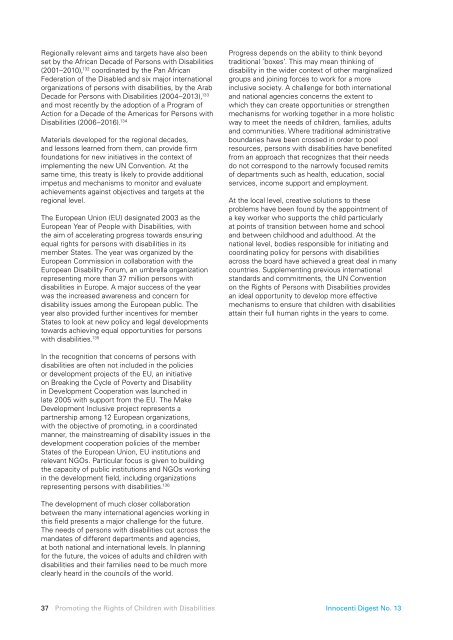Promoting the Rights of Children with Disabilities, UNICEF
Promoting the Rights of Children with Disabilities, UNICEF
Promoting the Rights of Children with Disabilities, UNICEF
- No tags were found...
You also want an ePaper? Increase the reach of your titles
YUMPU automatically turns print PDFs into web optimized ePapers that Google loves.
Regionally relevant aims and targets have also beenset by <strong>the</strong> African Decade <strong>of</strong> Persons <strong>with</strong> <strong>Disabilities</strong>(2001–2010), 132 coordinated by <strong>the</strong> Pan AfricanFederation <strong>of</strong> <strong>the</strong> Disabled and six major internationalorganizations <strong>of</strong> persons <strong>with</strong> disabilities, by <strong>the</strong> ArabDecade for Persons <strong>with</strong> <strong>Disabilities</strong> (2004–2013), 133and most recently by <strong>the</strong> adoption <strong>of</strong> a Program <strong>of</strong>Action for a Decade <strong>of</strong> <strong>the</strong> Americas for Persons <strong>with</strong><strong>Disabilities</strong> (2006–2016). 134Materials developed for <strong>the</strong> regional decades,and lessons learned from <strong>the</strong>m, can provide firmfoundations for new initiatives in <strong>the</strong> context <strong>of</strong>implementing <strong>the</strong> new UN Convention. At <strong>the</strong>same time, this treaty is likely to provide additionalimpetus and mechanisms to monitor and evaluateachievements against objectives and targets at <strong>the</strong>regional level.The European Union (EU) designated 2003 as <strong>the</strong>European Year <strong>of</strong> People <strong>with</strong> <strong>Disabilities</strong>, <strong>with</strong><strong>the</strong> aim <strong>of</strong> accelerating progress towards ensuringequal rights for persons <strong>with</strong> disabilities in itsmember States. The year was organized by <strong>the</strong>European Commission in collaboration <strong>with</strong> <strong>the</strong>European Disability Forum, an umbrella organizationrepresenting more than 37 million persons <strong>with</strong>disabilities in Europe. A major success <strong>of</strong> <strong>the</strong> yearwas <strong>the</strong> increased awareness and concern fordisability issues among <strong>the</strong> European public. Theyear also provided fur<strong>the</strong>r incentives for memberStates to look at new policy and legal developmentstowards achieving equal opportunities for persons<strong>with</strong> disabilities. 135Progress depends on <strong>the</strong> ability to think beyondtraditional ’boxes’. This may mean thinking <strong>of</strong>disability in <strong>the</strong> wider context <strong>of</strong> o<strong>the</strong>r marginalizedgroups and joining forces to work for a moreinclusive society. A challenge for both internationaland national agencies concerns <strong>the</strong> extent towhich <strong>the</strong>y can create opportunities or streng<strong>the</strong>nmechanisms for working toge<strong>the</strong>r in a more holisticway to meet <strong>the</strong> needs <strong>of</strong> children, families, adultsand communities. Where traditional administrativeboundaries have been crossed in order to poolresources, persons <strong>with</strong> disabilities have benefitedfrom an approach that recognizes that <strong>the</strong>ir needsdo not correspond to <strong>the</strong> narrowly focused remits<strong>of</strong> departments such as health, education, socialservices, income support and employment.At <strong>the</strong> local level, creative solutions to <strong>the</strong>seproblems have been found by <strong>the</strong> appointment <strong>of</strong>a key worker who supports <strong>the</strong> child particularlyat points <strong>of</strong> transition between home and schooland between childhood and adulthood. At <strong>the</strong>national level, bodies responsible for initiating andcoordinating policy for persons <strong>with</strong> disabilitiesacross <strong>the</strong> board have achieved a great deal in manycountries. Supplementing previous internationalstandards and commitments, <strong>the</strong> UN Conventionon <strong>the</strong> <strong>Rights</strong> <strong>of</strong> Persons <strong>with</strong> <strong>Disabilities</strong> providesan ideal opportunity to develop more effectivemechanisms to ensure that children <strong>with</strong> disabilitiesattain <strong>the</strong>ir full human rights in <strong>the</strong> years to come.In <strong>the</strong> recognition that concerns <strong>of</strong> persons <strong>with</strong>disabilities are <strong>of</strong>ten not included in <strong>the</strong> policiesor development projects <strong>of</strong> <strong>the</strong> EU, an initiativeon Breaking <strong>the</strong> Cycle <strong>of</strong> Poverty and Disabilityin Development Cooperation was launched inlate 2005 <strong>with</strong> support from <strong>the</strong> EU. The MakeDevelopment Inclusive project represents apartnership among 12 European organizations,<strong>with</strong> <strong>the</strong> objective <strong>of</strong> promoting, in a coordinatedmanner, <strong>the</strong> mainstreaming <strong>of</strong> disability issues in <strong>the</strong>development cooperation policies <strong>of</strong> <strong>the</strong> memberStates <strong>of</strong> <strong>the</strong> European Union, EU institutions andrelevant NGOs. Particular focus is given to building<strong>the</strong> capacity <strong>of</strong> public institutions and NGOs workingin <strong>the</strong> development field, including organizationsrepresenting persons <strong>with</strong> disabilities. 136The development <strong>of</strong> much closer collaborationbetween <strong>the</strong> many international agencies working inthis field presents a major challenge for <strong>the</strong> future.The needs <strong>of</strong> persons <strong>with</strong> disabilities cut across <strong>the</strong>mandates <strong>of</strong> different departments and agencies,at both national and international levels. In planningfor <strong>the</strong> future, <strong>the</strong> voices <strong>of</strong> adults and children <strong>with</strong>disabilities and <strong>the</strong>ir families need to be much moreclearly heard in <strong>the</strong> councils <strong>of</strong> <strong>the</strong> world.37 <strong>Promoting</strong> <strong>the</strong> <strong>Rights</strong> <strong>of</strong> <strong>Children</strong> <strong>with</strong> <strong>Disabilities</strong> Innocenti Digest No. 13
















